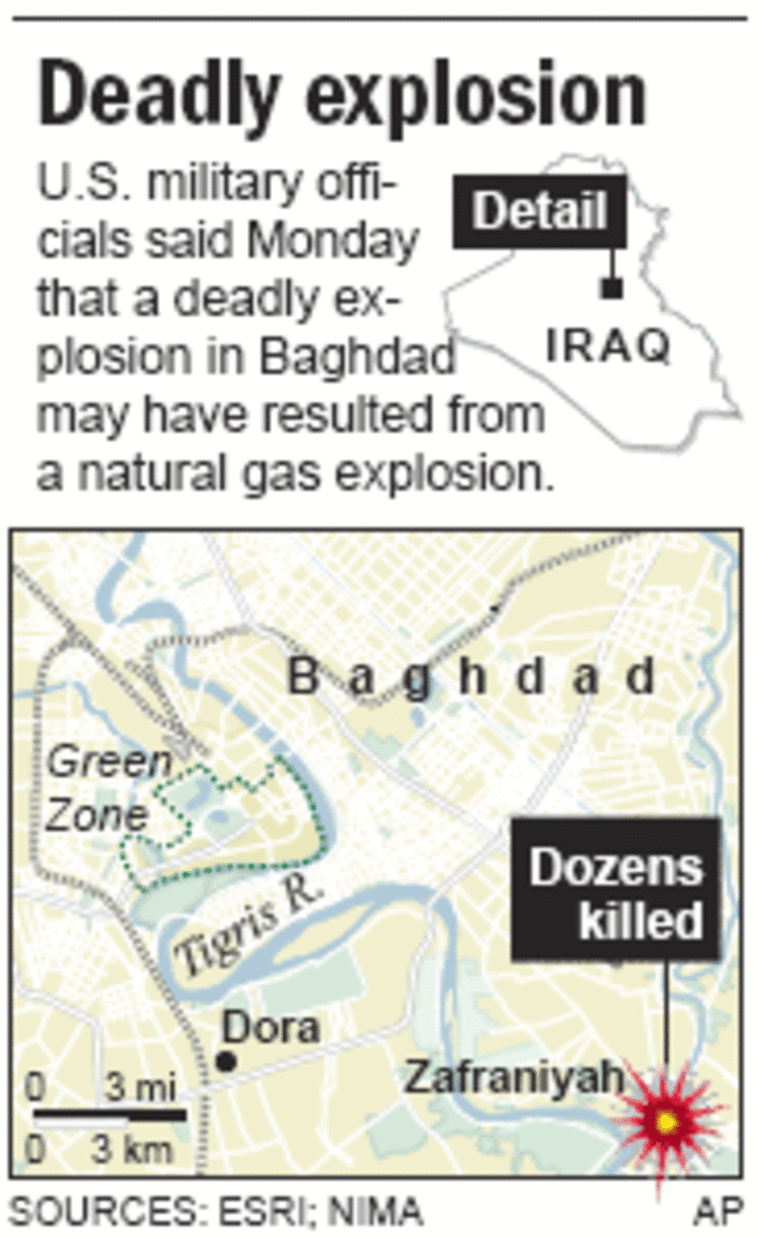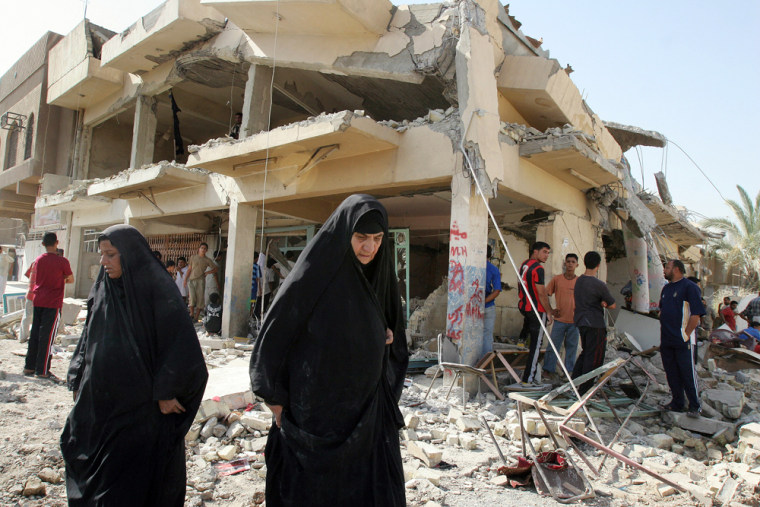A deadly series of explosions in a Shiite neighborhood of Baghdad triggered a new battle Monday — between the U.S. military and the Iraqis over what caused the blasts. The number of casualties also was in dispute.
A U.S. military spokesman blamed the Sunday evening explosions in Zafraniyah on a gas line explosion that he said triggered secondary blasts and devastated the working class district on the southeastern edge of the city.
But Iraqi police and Prime Minister Nouri al-Maliki said the neighborhood was hit by car bombs and a rocket barrage, which the Interior Ministry said was unleashed from a Sunni neighborhood that U.S. troops have targeted in their security crackdown.
“The terrorists planned this ugly crime so that it would inflict maximum harm on innocent civilians, and this is proof of their deep-rooted hatred for Iraq and their attempt to incite sectarianism,” al-Maliki said.
It was impossible to determine who was right. The Iraqis may have spoken too quickly to score public relations points by blaming government opponents. And the Americans have long been reluctant to acknowledge that sectarian hatred threaten to plunge the country into all-out civil war.
Differing interpretations
Each side insisted its interpretation of Sunday’s events was correct.
U.S. ordnance teams went to Zafraniyah and found “no evidence” of anything other than a “significant gas explosion,” U.S. military spokesman Maj. Gen. William Caldwell said.

“If in fact there had been a hole in the ground, there would be some residue from a Katyusha rocket if one had been fired there,” he told reporters, adding that American experts are “fairly good” at determining the cause of an explosion.
Interior Ministry spokesman Col. Saddoun Abu al-Ula said Iraqi experts had examined the area and concluded the explosions were caused by car bombs and rockets fired from the mostly Sunni neighborhood of Dora — evidence that sectarian violence shows no sign of abating despite an additional 12,000 U.S. and Iraqi troops soldiers rushed to the capital.
“From the extent of the damage and some of the remains, it is clear that the explosions were caused by bombs and rockets,” Abu al-Ula said. “What the Americans are saying is not correct. Maybe they are trying not to shoulder responsibility because the rockets were fired from Dora where there is heavy U.S. deployment.”
Extremist group claims responsibility
Adding to the uncertainty, a Sunni extremist group claimed responsibility for the blasts, saying in an Internet statement that it blew up two car bombs and fired 120 mm mortar shells to punish Shiites for “killing unarmed Sunnis” and cooperating with the Americans.
The group, the al-Sahaba Soldiers, had claimed it carried out a complex attack last month against another Shiite district of Baghdad using car bombs, rockets and mortars.
While the Iraqis agreed that the blasts were due to an attack, they didn’t agree on how many people were killed or injured.
Defense Ministry spokesman Mohammed Askari said 27 people died and 100 were wounded. The prime minister’s office put the death toll at 47, while a member of the Baghdad city council, Nashaat al-Hassani told state television that 76 people were killed.
Casualty tolls in major attacks often vary, with individual government departments providing different figures — although the gap in the Zafraniyah figures was wider than usual. It is usually impossible to explain the discrepancies.
‘Against the whole nation’
While the powerbrokers bickered over the details, the people of Zafraniyah cleaned up the rubble, buried their dead and tried to come to terms with their loss. Cars drove through the rubble-littered streets with wooden caskets of the dead strapped to their roofs.
Huge slabs of concrete that once were ceilings in an apartment building lay atop each other in a heap at one spot. A pedestrian bridge, ripped off its mooring, crushed a car underneath.
A wide hole in the roof of a house exposed steel reinforcement rods bent inward. The blackened wreckage of an overturned car lay nearby.
A middle-aged man in a bloodstained dishdasha, the traditional Arab robe, wandered aimlessly, hitting his face with his hands in grief. Residents said his six children were crushed to death when his house collapsed.
“This is terrorism against the whole nation,” said Ali al-Sayedi, a municipal council member.
At least 13 other people were killed Monday in shootings and bombings across Iraq, including three metal workers shot by gunmen in the northern city of Mosul.
